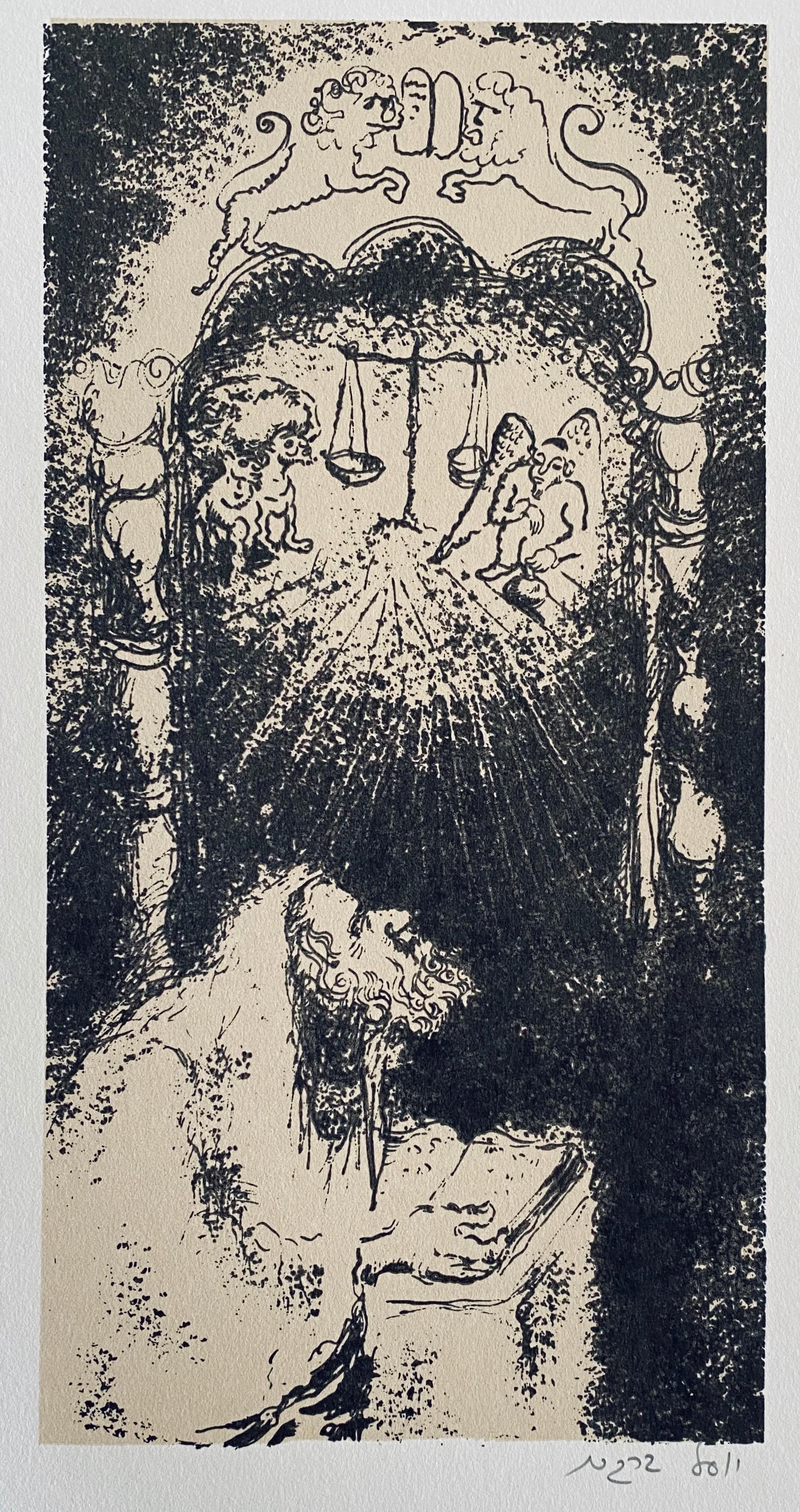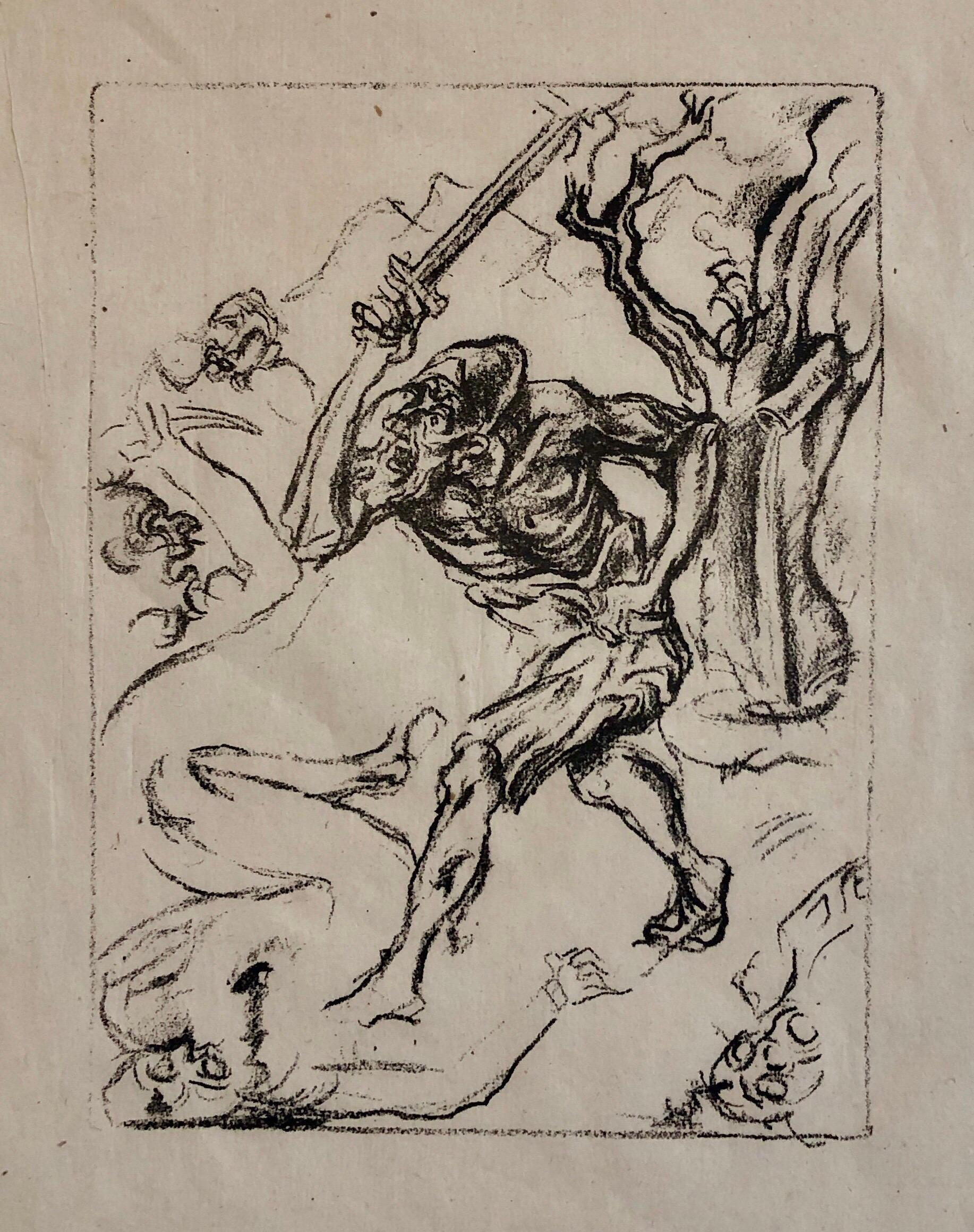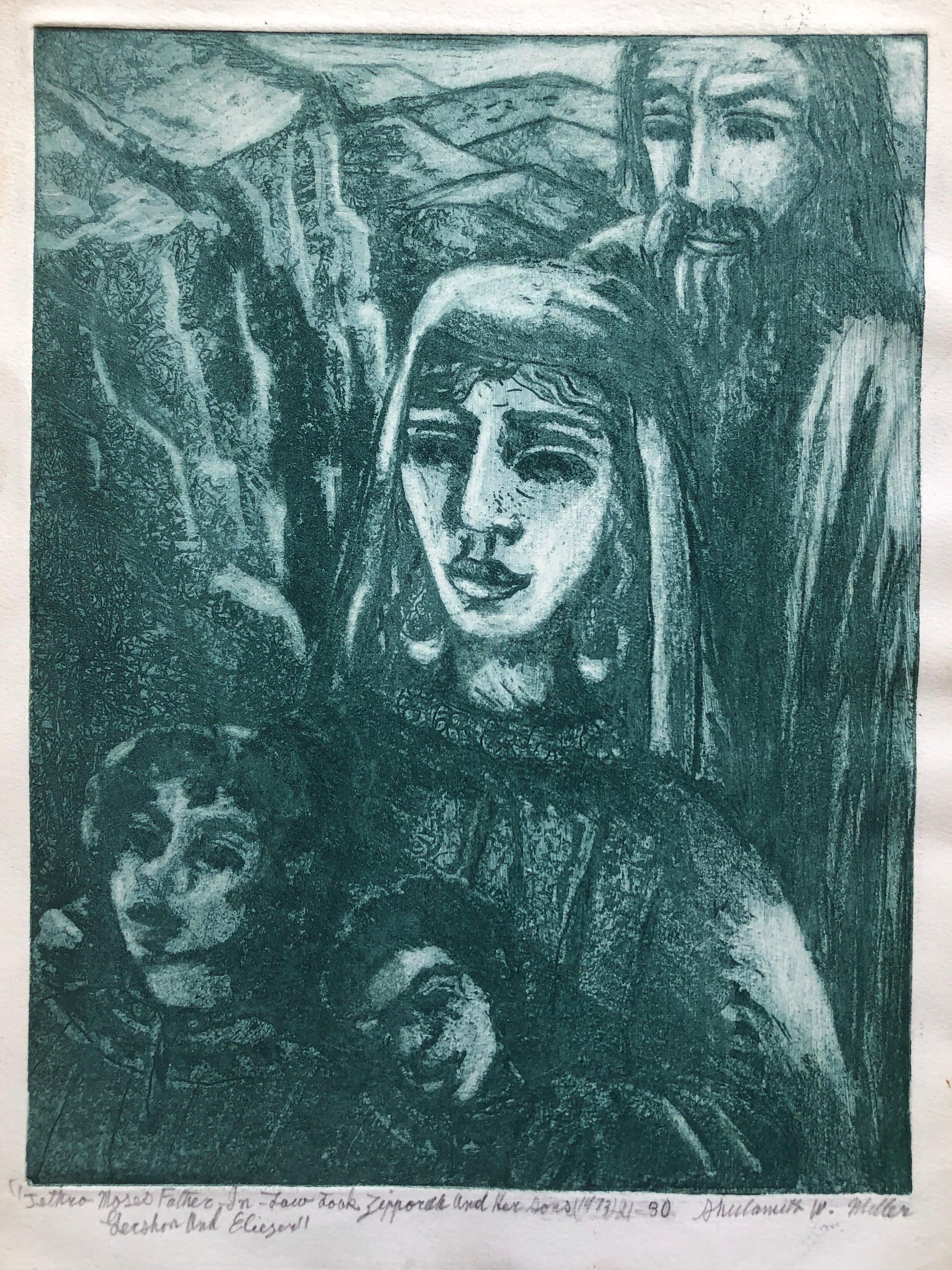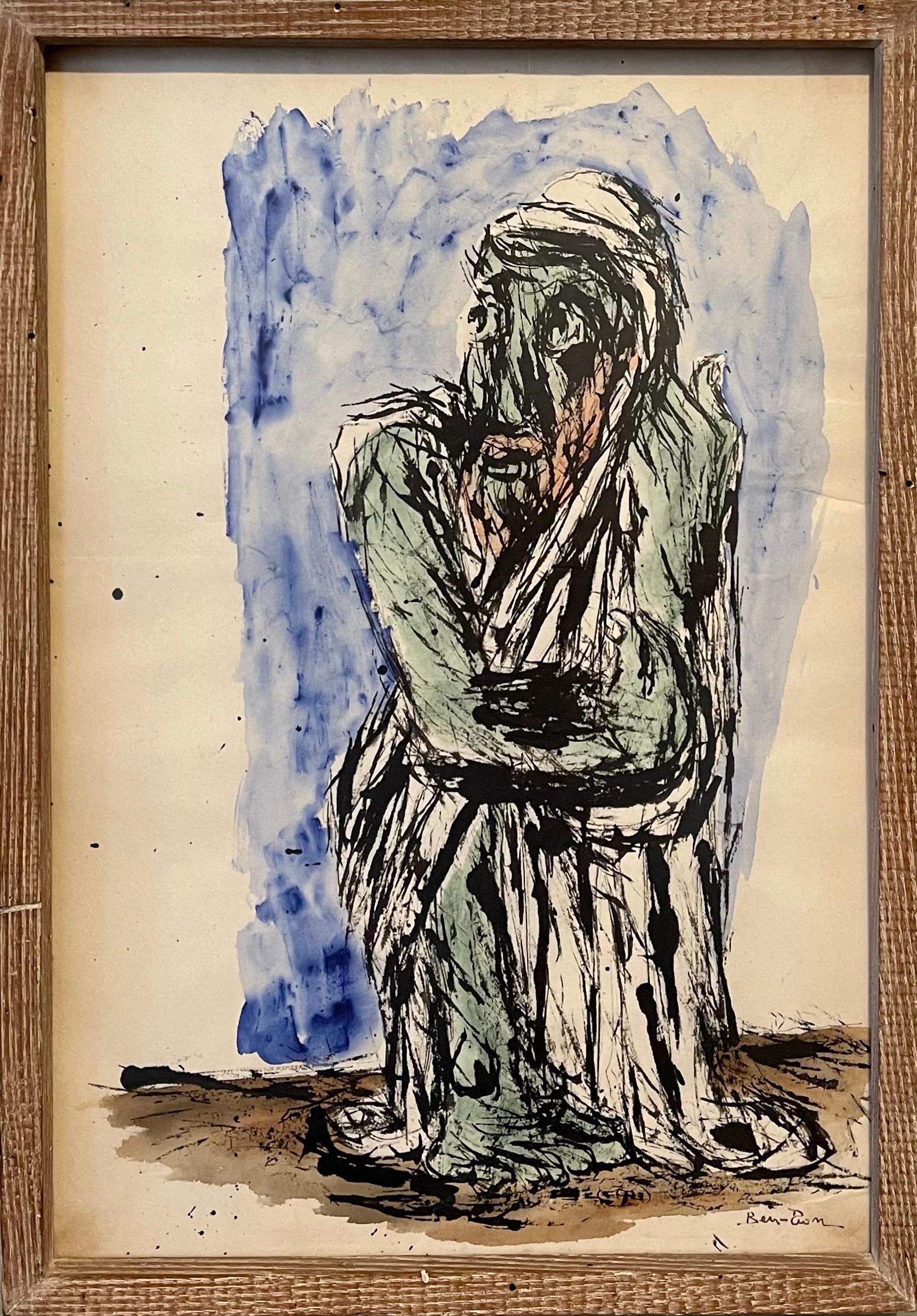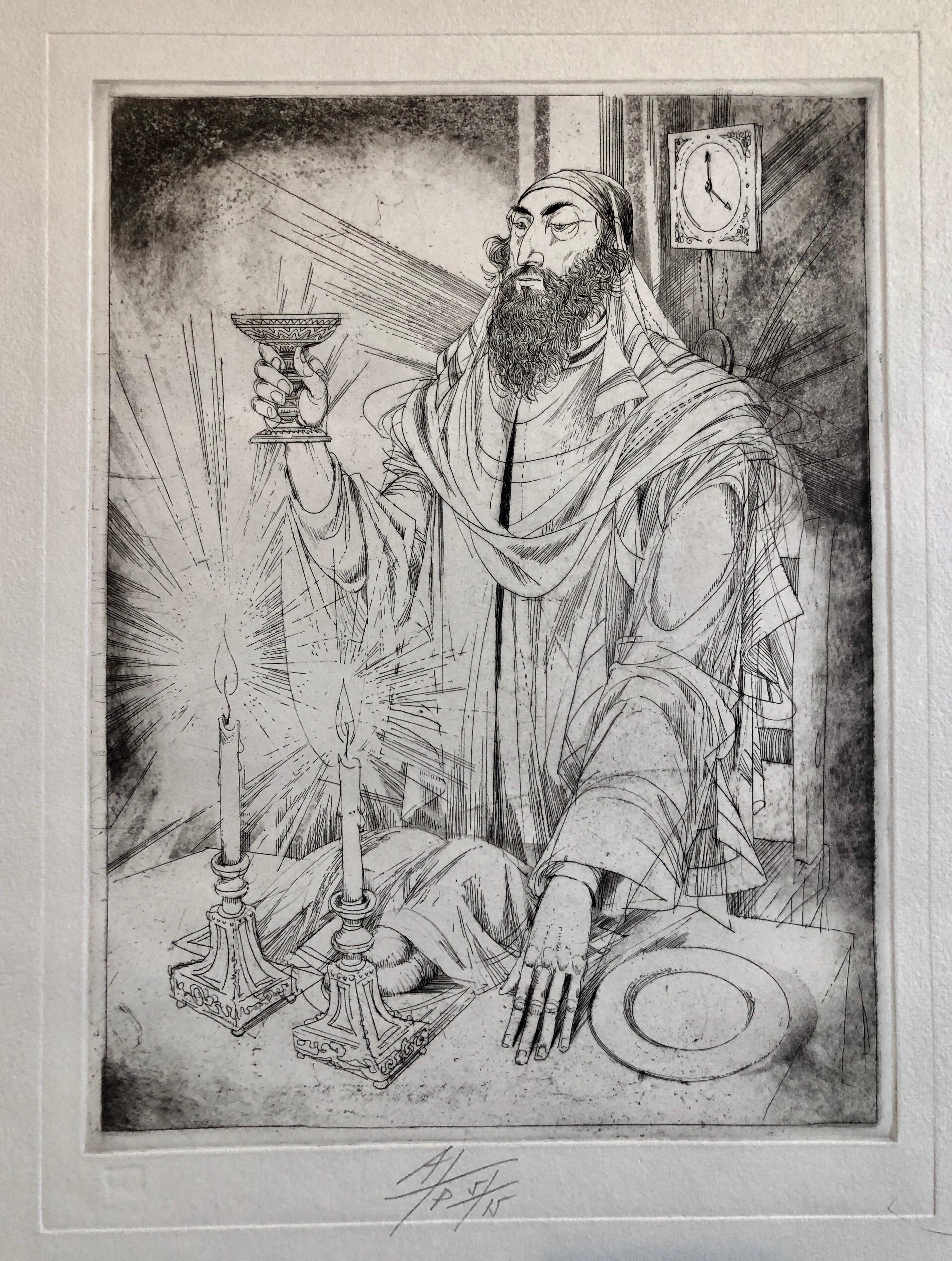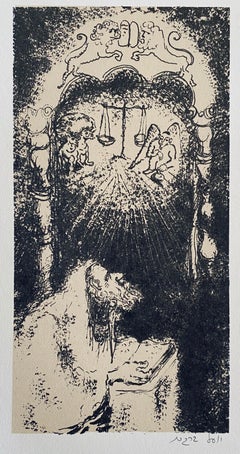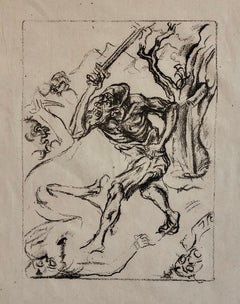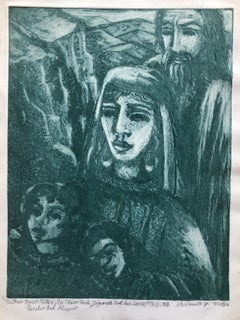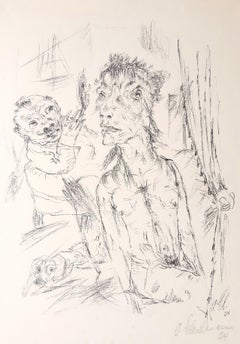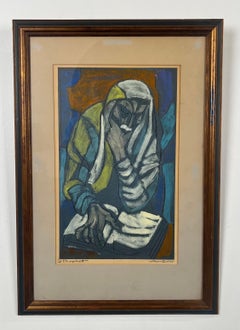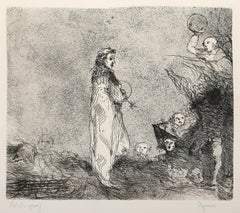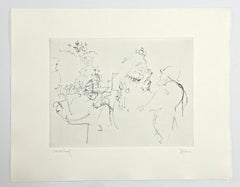Items Similar to Biblical Prophet Etching American Modernist WPA Artist
Want more images or videos?
Request additional images or videos from the seller
1 of 7
Ben-Zion WeinmanBiblical Prophet Etching American Modernist WPA Artist
$550
£424.13
€483.64
CA$784.41
A$857.27
CHF 451.12
MX$10,268.01
NOK 5,677.86
SEK 5,302.90
DKK 3,612.32
About the Item
Born in 1897, Ben-Zion Weinman celebrated his European Jewish heritage in his visual works as a sculptor, painter, and printmaker. Influenced by Spinoza, Knut Hamsun, and Wladyslaw Reymont, as well as Hebrew literature, Ben-Zion wrote poetry and essays that, like his visual work, attempt to reveal the deep “connection between man and the divine, and between man and earth.”
An emigrant from the Ukraine, he came to the US in 1920. He wrote fairy tales and poems in Hebrew under the name Benzion Weinman, but when he began painting he dropped his last name and hyphenated his first, saying an artist needed only one name.
Ben-Zion was a founding member of “The Ten: An Independent Group” The Ten” a 1930’s avant-garde group, Painted on anything handy. Ben-Zion often used cabinet doors (panels) in his work. Other members of group included Ilya Bolotowsky, Lee Gatch, Adolf Gottlieb, Louis Harris, Yanhkel Kufeld, Marcus Rothkowitz (later known as Mark Rothko), Louis Schanker, and Joseph Solman. The Art of “The Ten” was generally described as expressionist, as this style offered the best link between modernism and social art. Their exhibition at the Mercury Gallery in New York held at the same time as the Whitney Annual Exhibition of Contemporary American Painting, included a manifesto concentrating on aesthetic questions and criticisms of the conservative definition of modern art imposed by the Whitney. Ben-Zion’s work was quickly noticed. The New York Sun said he painted “furiously” and called him “the farthest along of the lot.” And the triptych, “The Glory of War,” was described by Art News as “resounding.”
By 1939, The Ten disbanded because most of the members found individual galleries to represent their work. Ben-Zion had his first one-man show at the Artist’s Gallery in Greenwich Village and J.B. Neumann, the highly esteemed European art dealer who introduced Paul Klee, (among others) to America, purchased several of Ben-Zion’s drawings. Curt Valentin, another well-known dealer, exhibited groups of his drawings and undertook the printing of four portfolios of etchings, each composed of Ben-Zion’s biblical themes.
Ben-Zion’s work is represented in many museums throughout the country including the Metropolitan, the Whitney, and the Museum of Modern Art in New York, the Art Institute of Chicago, the Philadelphia Museum of Art and the Phillips Collection, Washington. The Jewish Museum in New York opened in 1948 with a Ben-Zion exhibition.
“Ben-Zion has his hands on the pulse of the common man and his natural world”
As he emerged as an artist Ben-Zion never lost his gift for presenting the ordinary in ways that are vital, fresh and filled with emotions that are somber and exhilarating, joyous and thoughtful, and ultimately, filled with extraordinary poetic simplicity.
Ben-Zion consistently threaded certain subject matter—nature, still life, the human figure, the Hebrew Bible, and the Jewish people—into his work throughout his life. "In all his work a profound human feeling remains. Sea and sky, even sheaves of wheat acquire a monolithic beauty and simplicity which delineates the transient as a reflection of the eternal. This sensitive inter- mingling of the physical and metaphysical is one of the most enduring features of Ben-Zion's works." (Excerpt from Stephen Kayser, “Biblical Paintings,” The Jewish Museum Catalogue, 1952).
Ben-Zion continued his style of representational painting based on the abstract, and is perhaps best known for his Biblical paintings and etchings.
Ben-Zion received an American Jewish Congress award.
In 1987, Ben-Zion died in his home in the Chelsea section of Manhattan. He was 90 years old.
- Creator:Ben-Zion Weinman (1897 - 1987, American)
- Dimensions:Height: 21.25 in (53.98 cm)Width: 13.25 in (33.66 cm)
- Medium:
- Movement & Style:
- Period:
- Condition:paper has even toning and light foxing.
- Gallery Location:Surfside, FL
- Reference Number:1stDibs: LU38212959482
About the Seller
4.9
Platinum Seller
Premium sellers with a 4.7+ rating and 24-hour response times
Established in 1995
1stDibs seller since 2014
1,840 sales on 1stDibs
Typical response time: 1 hour
- ShippingRetrieving quote...Shipping from: Surfside, FL
- Return Policy
More From This Seller
View AllBiblical Prophet
By Ben-Zion Weinman
Located in Surfside, FL
Born in 1897, Ben-Zion Weinman celebrated his European Jewish heritage in his visual works as a sculptor, painter, and printmaker. Influenced by Spinoza, Knut Hamsun, and Wladyslaw R...
Category
Mid-20th Century Expressionist Figurative Prints
Materials
Etching
Israeli Expressionist Yosl Bergner Modernist Lithograph
By Yosl Bergner
Located in Surfside, FL
Hand signed in Hebrew Lower right. Dimensions: H 19.5" x 13.5"
Bergner, Yosl (Vladimir Jossif) (b Vienna, 13 Oct 1920). surrealist, surrealism. belongs to the generation of people...
Category
Mid-20th Century Modern Figurative Prints
Materials
Lithograph
Jakob Steinhardt Jewish German Expressionist Lithograph Israeli Early Bezalel
By Jacob Steinhardt
Located in Surfside, FL
plate signed.
Jacob Steinhardt
1887-1968
Steinhardt, Jakob, Painter and Woodcut Artist. b. 1887, Yaacov Steinhardt was born in the then remote, largely Polish town of Zerkow in the Posen District of Germany. (poland/german) Immigrated 1933. Studies: 1906 School of Art, 1906 Studied in Berlin Arts and Crafts School. Berlin; 1907 painting with Lovis Corinth and engraving and etching with Hermann Struck; advanced studies, 1908-10 Paris, with Henri Matisse and Steinlen; 1911 Italy. Teaching: Bezalel, Jerusalem, 1953-57 Director. 1910 Participated in the “New Sezession”, Berlin. 1912 together with Ludwig Meidner and Janthur he founded the "Pathetiker" group very early in the German expressionist movement. Running afoul of the Nazis, he fled to Tel-Aviv and then Jerusalem in the early 30s, showing in “Der Sturm” Gallery. 1914 Exhibited with ludwig Meidner at first Expressionist Exhibition in Berlin. Worked mainly in woodcuts depicting biblical and other Jewish subjects. 1955-58 International awards for his woodcuts. receives graphic commissions from Fritz Gurlitt. 1922 Marries Minni Gumpert. Active in organizing Secession exhibits. 1925 Trips to Mark Brandenburg and Holy Land. Turns primarily to painting; stops work on etchings and lithographs. 1933 Emigrates to the Palestine. 1934 Moves to Jerusalem and opens an art school; attempts some etchings. 1948 Closes the art school and becomes Chairman of Graphics Department, Bezalel School for Arts and Crafts. 1954-57 Director of Bezalel School for Arts and Crafts. Taken up by J. B. Neumann who became the agent for his etchings. Exhibited Sturm Gallery, Herbst-salon. 1914 Outbreak of World War I; Steinhardt enlists in German army. 1916-18 First on Eastern Front in Poland and Lithuania, then after short training period in Berlin, sent to Macedonia. 1917 Exhibition of Lithuanian drawings at Berlin Secession in Spring. Elected member of the Secession.
He often used wood-cutting techniques that were popular amongst German Expressionists. Steinhardt was driven to express ideas clearly and decisively through art.
Amongst the themes found in his work the prophets of the Bible, such as Jonah, are noticeable. Steinhardt identified deeply with Jonah due to his attempt to run from God's call to duty.
Additionally, the image of beggars was often found in Steinhardt's works and in his artistic presentation of the less fortunate, the artist's love for his fellow man becomes evident.
Moreover, the grotesque was a theme noticeable in Steinhardt's earliest pieces. These were fantastical images; it was unclear whether or not they were human or demon. In the 1950's, Steinhardt returned to these images upon learning of the Holocaust of Europe's Jews. At that time he resided in New York and there, in the shadow of the skyscrapers, Steinhardt's reaction to WWII was expressed through his art.
A Collection of Works by Artists of the Land of IsraelThe Bezalel National Museum, Jerusalem 1940 Artists: Shemi, Menahem Rubin...
Category
20th Century Expressionist Figurative Prints
Materials
Woodcut
Modernist "Jethro" Aquatint Etching Israeli Judaica Bezalel School Woman Artist
By Shulamith Wittenberg Miller
Located in Surfside, FL
Etching hand signed and dated in English. Titled, "Jethro, Moses father-in-law, took Zipporah, Gershon and Eliezer"
Shulamit Wittenberg Miller
Born 1908 in Jerusalem, attended Bezale...
Category
1970s Modern Figurative Prints
Materials
Etching
Abstract Expressionist Rabbi Watercolor Painting Jewish American Modernist WPA
By Ben-Zion Weinman
Located in Surfside, FL
Watercolor painting of standing prophet or Rabbi, Judaica artwork
Born in 1897, Ben-Zion Weinman celebrated his European Jewish heritage in his visual works as a sculptor, painter, ...
Category
Mid-20th Century Expressionist Abstract Drawings and Watercolors
Materials
Paper, Watercolor
Hungarian Modernist Judaica Etching Print Kiddush, Jewish Rabbi at Shabbat Feast
By Janos Kass
Located in Surfside, FL
From very small edition of 15 on handmade mould made paper, with Jewish star Magen David watermark. From the deluxe boxed portfolio edition.
János Kass (...
Category
1990s Expressionist Figurative Prints
Materials
Etching
You May Also Like
Bordellszene - Original Lithograph by Otto Gleichmann - 1924
By Otto Gleichmann
Located in Roma, IT
Bordellszene is an original lithograph, realized by Otto Gleichmann in 1924, hand- signed and dated.
In very good conditions.
Here the artwork represents two men in Expressionistic...
Category
1920s Expressionist Figurative Prints
Materials
Lithograph
Irving Amen " Prophet" Hand-Signed & Numbered Color Woodcut Print Circa 1964
By Irving Amen
Located in Plainview, NY
Irving Amen " Prophet" Hand-Signed & Numbered Color Woodcut Print Circa 1964
A powerful and contemplative work by celebrated American printmaker Irving Amen, Prophet exemplifies the...
Category
20th Century Expressionist Figurative Prints
Materials
Woodcut
Prophet, Modern Etching by Vincent Capraro
Located in Long Island City, NY
Vincent Capraro (1929 - 2016) - Prophet, Year: circa 1968, Medium: Etching, signed and numbered in pencil, Edition: AP, Image Size: 8 x 9.75 inches, Size: 11.25 x 13.75 in. (28....
Category
1960s Modern Figurative Prints
Materials
Etching
signed original etching - Artist's Proof
By Jack Levine
Located in Henderson, NV
Medium: original soft ground etching. Signed in pencil and annotated "Artist's Proof". Printed in 1967 for the Dreigroschen Film portfolio and published by Touchstone Publishers. Thi...
Category
1960s Expressionist Prints and Multiples
Materials
Etching
Figures - Original Lithograph by Aligi Sassu - 1980s
Located in Roma, IT
Figures is an original lithograph realized by the Italian artist Aligi Sassu.
This Artwork is depicted through strong and confident strokes in a well-balanced composition.
Signed o...
Category
1980s Modern Figurative Drawings and Watercolors
Materials
Paper, Lithograph
Galizischer Bletter . Original Etching by Erich Wolsfeld - 1915
Located in Roma, IT
Galizischer Bletter is a fine black and white etching on cream-colored paper, realized by Erich Wolfsfeld ( Krojanke, 1884 - London, 1956).
From the portfolio Freunde Graphischer Kunst, Leipzig, 1915.
In excellent condition, with the original cream-colored cardboard passepartout included with the drystamp of the publishing house logo "III. s" at the center on lower margin. A little rip on the lower right corner of the passepartout.
This modern original print representing a street homeless begging demonstrates a great human and pictorial sensibility and surely is an artwork conceived in his Roman period when this kind of subjects was frequent.
Erich Wolfsfeld (Krojanke, 1884 - London, 1956).
Erich Wolfsfeld learned to etch in the studio of Hans Meyer, From 1907 worked in Rome, where he met Otto Greiner...
Category
1910s Modern Figurative Prints
Materials
Etching
More Ways To Browse
Mid Century American Artists
Sheaves Of Wheat
Kayser Vintage
Michelangelo Etching
Murakami Flower Ball
New Orleans Jazz Art
Original Toulouse Lautrec Lithograph
Peter Sager
Picasso Saltimbanques
Picture Of Dorian Gray
Pierre Casanova
Police Mugshot
Privat Livemont
Rene Portocarrero
Renoir Drawings
Royal Albert Old Country Roses
Salvador Dali 1967
Salvador Dali Mythology
